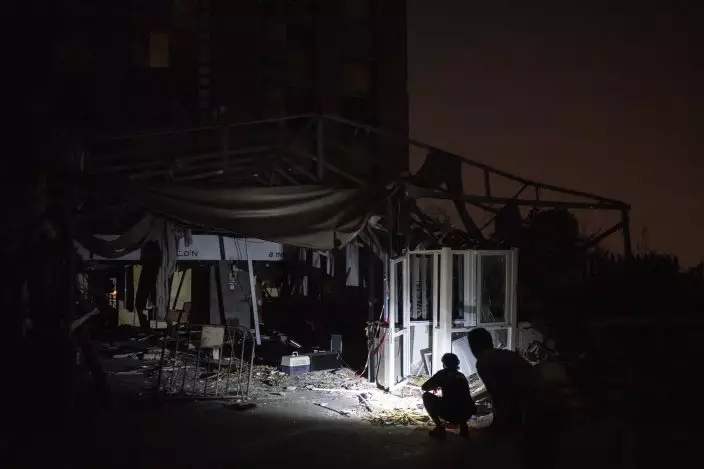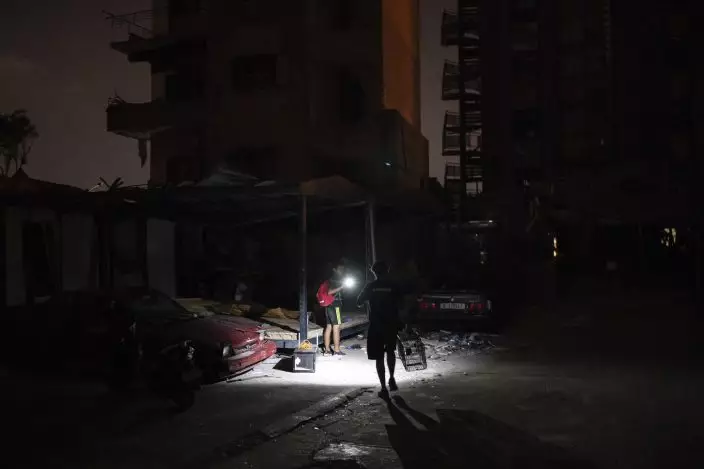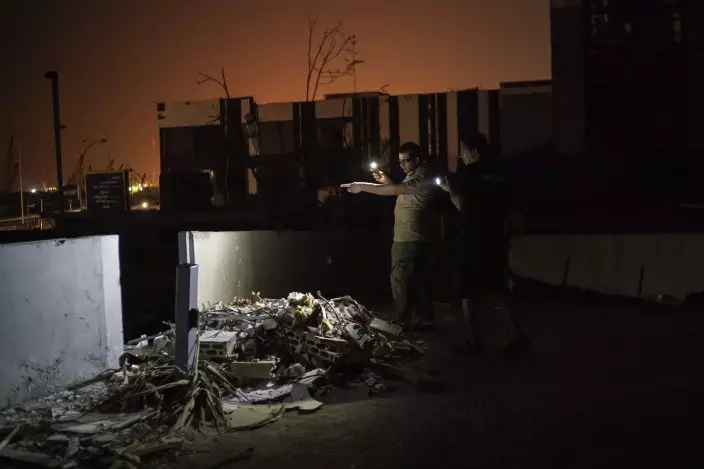When the massive explosion tore through Beirut last week, it did not only kill and injure thousands of people and destroy a large part of the city — it also left scores of animals trapped or lost in the rubble of the Lebanese capital.
Animals Lebanon, a Beirut-based group, said it sprang into action within hours of the blast. Since then, dozens of volunteers have been working around the clock to rescue the animals.
The group's search and rescue teams have been deployed around the city and have received hundreds of requests by pet owners asking to help track their dogs and cats — and sometimes even birds — from the devastation that unfolded after the blast.

Kamal Khatib, right, and other volunteers of Animals Lebanon, remove a kitten from a cage trap after rescuing her and other family members from debris of a damaged building near the site of last week's massive explosion in Beirut, Lebanon, Thursday, Aug. 13, 2020. The volunteers say they have happily reunited dozens of pets with their owners. But many others remain in the group's shelter, waiting for their owners to pick them up or locate them. (AP PhotoFelipe Dana)
The Aug. 4 explosion in the Beirut Port, when thousands of tons of ammonium nitrate ignited, sent a shock wave through several neighborhoods of the city, destroying thousands of apartments and blanketing the streets with glass and debris. Nearly 180 people were killed and 6,000 were wounded; 30 are still missing.
The blast also terrified animals, which escaped from the destroyed buildings or got trapped by the rubble. Several were killed, later found buried under the debris.
Animals Lebanon volunteers say they have happily reunited dozens of pets with their owners. But many others remain in the group's shelter, waiting for owners to come pick them up or claim them.

Volunteers of Animals Lebanon wait for a cat to enter a trap they setup in a damaged building near the site of last week's massive explosion in Beirut, Lebanon, Thursday, Aug. 13, 2020. Teams go out at night and early mornings to search for the pets. Streets crowded with people, going through what remains of their building, and noisy bulldozers and lift forks are keeping the pets in hiding. (AP PhotoFelipe Dana)
Jason Mier, the group's director, says not only animals were affected by the explosion. The blast also killed many of Beirut's pigeons — and rats. Some 50 stray cats have been found dead, killed by collapsed buildings, he said.
Mier, an American who has lived in Lebanon for over 10 years, said his group has handled about 200 animals since the Aug. 4 blast, reuniting up to 115 cats with their owners.
Dogs were easier to spot and were found in the first two days after the explosion, he said.

Kamal Khatib, of Animals Lebanon, carries a cage trap as he prepares to rescue a family of cats hiding among debris of a damaged building near the site of last week's massive explosion in Beirut, Lebanon, Thursday, Aug. 13, 2020.Teams go out at night and early mornings to search for the pets. Streets crowded with people, going through what remains of their building, and noisy bulldozers and lift forks are keeping the pets in hiding. (AP PhotoFelipe Dana)
Kamal Khatib, a volunteer with Animals Lebanon, specializes in pulling those trapped under the rubble after the scouting teams first track them down. The explosion, he said, has equally traumatized the animals, which makes rescue and recovery harder.
A trapped animal is terrified, he said, recounting how he tries to slowly approach a location where, for example, a cat is trapped, and quietly places a trap.
“Even the friendliest of the house cats would scratch and bite,” he said. “Definitely, it is very traumatizing for them. And from the rescues we see many of them were calling for help, they were crying."

Kamal Khatib, of Animals Lebanon, carries a cage with two kittens rescued among debris of a damaged building near the site of last week's massive explosion in Beirut, Lebanon, Thursday, Aug. 13, 2020. Teams go out at night and early mornings to search for the pets. Streets crowded with people, going through what remains of their building, and noisy bulldozers and lift forks are keeping the pets in hiding. (AP PhotoFelipe Dana)
Teams go out at night and early mornings to search for the pets, before the streets become too crowded with people going through what remains of their homes or noisy bulldozers and forklifts trying to clear the rubble. The noise and the commotion keeps the animals in hiding.
“We had few cases where we would rescue a cat and then the building would collapse," he said. ”Since the day of the explosion, we have maybe climbed more than 300 floors going up and down, looking, looking into elevator shafts, looking under cars, looking amid in the rubble."
“We are looking everywhere. It’s not easy at all,” Khatib said.

Kamal Khatib, of Animals Lebanon, and a security guard look for a family of cats hiding among debris of a damaged building near the site of last week's massive explosion in Beirut, Lebanon, Thursday, Aug. 13, 2020. Animals Lebanon deployed rescue teams around the city only hours after the blast and have since received hundreds of requests by pet owners asking to help track their dogs and cats among the chaos that unfolded after the blast. (AP PhotoFelipe Dana)
It is still not known what caused the fire responsible for igniting the nearly 3,000 tons of ammonium nitrate stored for years in Beirut’s port — apparently with the knowledge of top officials. Families of the dead and survivors on Friday asked the U.N. Security Council for an international investigation. French forensic experts have already joined the probe, in which FBI is also expected to take part.
The World Bank, in a preliminary assessment, said about 50,000 residential units were damaged and 80% of residential buildings and infrastructure in the neighborhoods near the blast were impacted, aside from the destruction to the port. The U.N. said more than 1,000 buildings were severely damaged.
For Khatib, it's moments of joy that make it all worthwhile — like on Thursday, when Animals Beirut pulled two tiny kittens from the debris of a building where a family had already been rescued.


